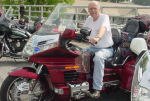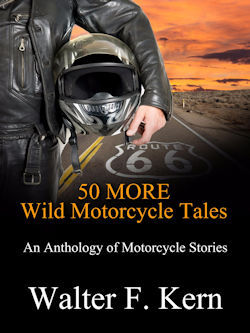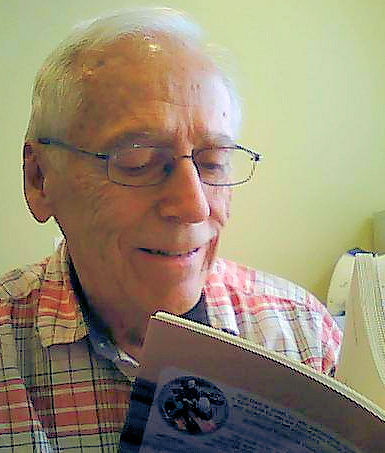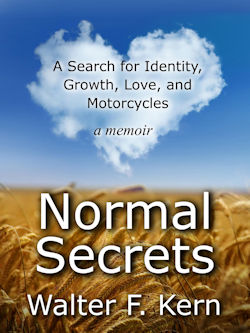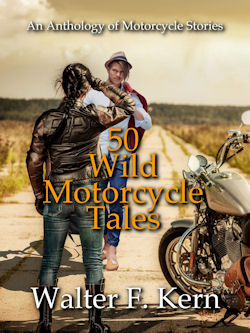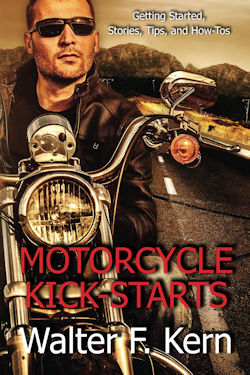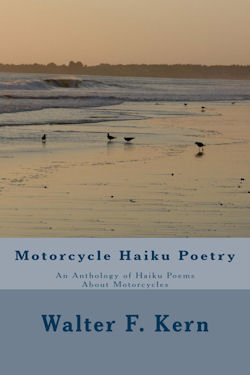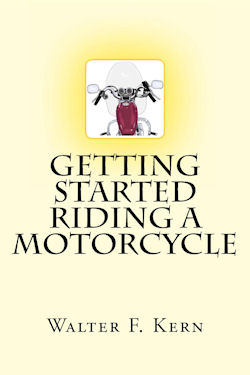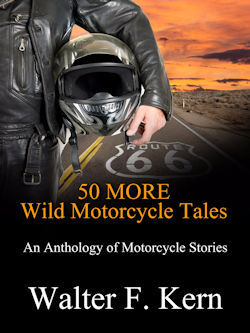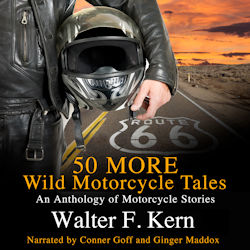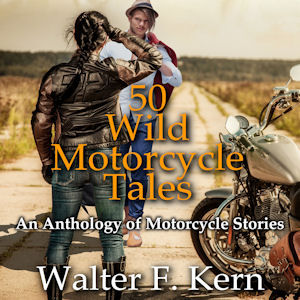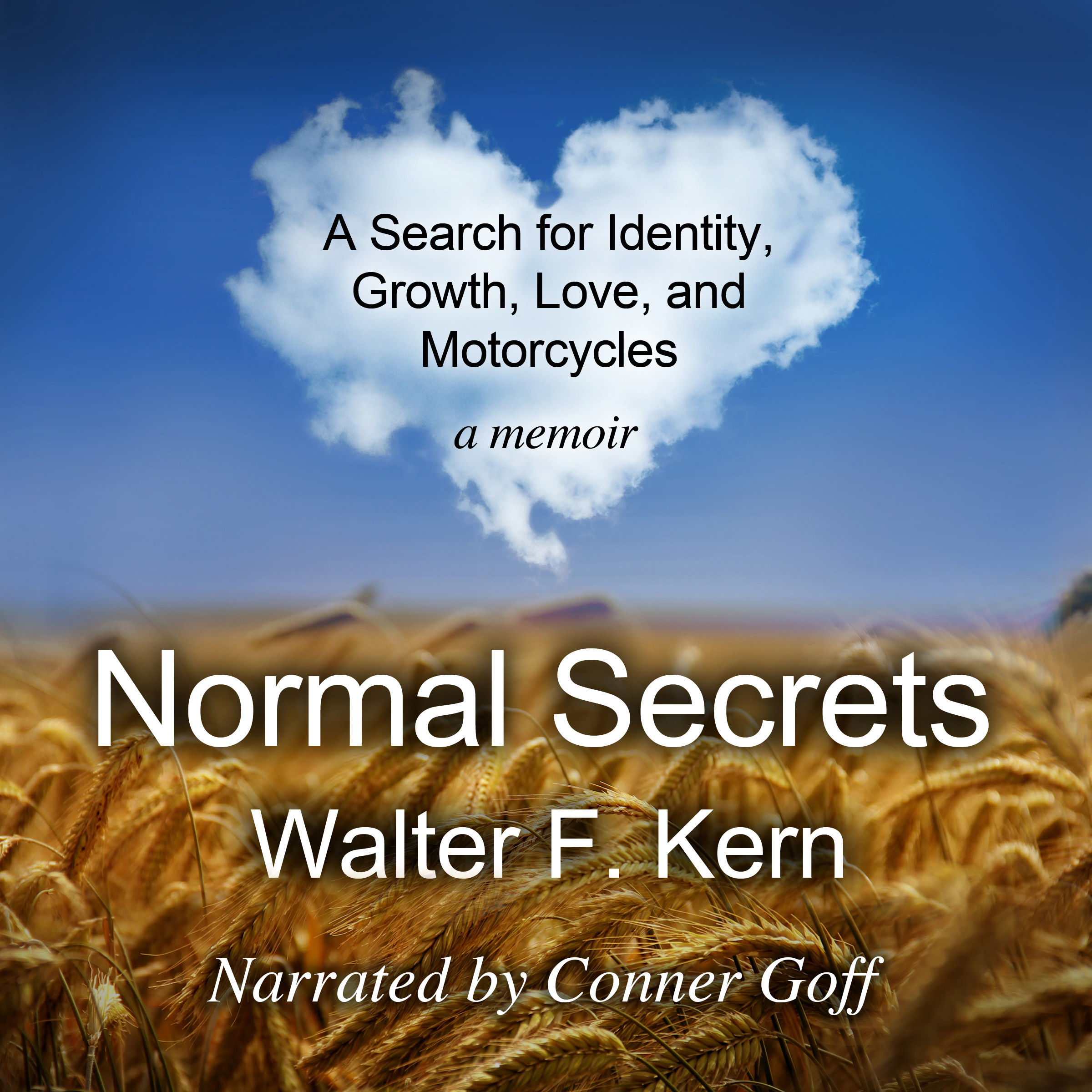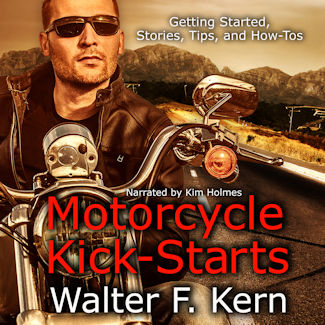Wild Motorcycle Tales Here's a great story from Pops Road King. Got your own story? Send it to me. The Wave Page 2 It was spring the next year when I was sitting high on my throne, watching the farm fields slip by when I saw two bikes coming towards us. As they rumbled past, both my father and I waved, but the other bikers kept their sunglasses locked straight ahead and did not acknowledge us. I remember thinking that they must have seen us because our waves were too obvious to miss. Why hadn't they waved back? I thought all bikers waved to one another. I patted my father on his shoulder and yelled, "How come they didn't wave to us?" "Don't know. Sometimes they don't." I remember feeling very puzzled. Why wouldn't someone wave back? Later that summer, I turned 12 and learned how to ride a bike with a clutch. I spent many afternoons on a country laneway beside our home, kicking and kicking to start my father's '55 BSA. When the bike would finally sputter to a start, my concentration would grow to a sharp focus as I tried to let out the clutch slowly while marrying it with just enough throttle to bring me to a smooth takeoff. More often, I lurched and stumbled forward while trying to keep the front wheel straight and remember to pick my feet up. A few feet farther down the lane, I would sigh and begin kicking again. A couple of years later, my older brother began road racing, and I became a racetrack rat. We spent many weekends wandering to several tracks in Ontario-Harewood, Mosport and eventually Shannonville. These were the early years of two-stroke domination, of Kawasaki green and 750 two-stroke triples, of Yvon Duhamel's cat-and-mouse games and the artistry of Steve Baker. Eventually, I started to pursue interests other than the race track. I got my motorcycle license and began wandering the back roads on my own. I found myself stopping along side roads if I saw a rider sitting alone, just checking to see if I could be of help. And I continued to wave to each biker I saw. But I remained confused as to why some riders never waved back. It left me with almost a feeling of rejection, as if I were reaching to shake someone's hand but they kept their arm hanging by their side. I began to canvass my friends about waving. I talked with people I met at bike events, asking what they thought. Most of the riders told me they waved to other motorcyclists and often initiated the friendly air handshake as they passed one another. I did meet some riders, though, who told me that they did not wave to other riders because they felt that they were different from other bikers. They felt that they were "a breed apart." One guy told me in colorful language: "I don't wave to no wusses." He went on to say that his kind of bikers were tough, independent, and they did not require or want the help of anyone, whether they rode a bike or not. I suspected that there were some people who bought a bike because they wanted to purchase an image of being tougher, more independent, a not-putting-up-with-anyone's-crap kind of person, but I did not think that this was typical of most riders. People buy bikes for different reasons. Some will be quick to tell you what make it is, how much they paid for it, or how fast it will go. Brand loyalty is going to be strong for some people whether they have a Harley, Ford, Sony, Nike or whatever. Some people want to buy an image and try to purchase another person's perception of them. But it can't be done. They hope that it can, but it can't. Still, there is a group of people who ride bikes who truly are a "breed apart." They appreciate both the engineering and the artistry in the machines they ride. Their bikes become part of who they are and how they define themselves to themselves alone. They don't care what other people think. They don't care if anyone knows how much they paid for their bike or how fast it will go. The bike means something to them that nothing else does. They ride for themselves and not for anyone else. They don't care whether anyone knows they have a bike. They may not be able to find words to describe what it means to ride, but they still know. They might not be able to explain what it means to feel the smooth acceleration and the strength beneath them. But they understand. These are the riders who park their bikes, begin to walk away and then stop. They turn and took back. They see something when they look at their bikes that you might not. Something more complex, something that is almost secret, sensed rather than known. They see their passion. They see a part of themselves. These are the riders who understand why they wave to other motorcyclists. They savor the wave. It symbolizes the connection between riders, and if they saw you and your bike on the side of the road, they would stop to help and might not even ask your name. They understand what you are up against every time you take your bike on the road: the drivers that do not see you, the ones that cut you off or tailgate you, the potholes that hide in wait, the rain, the cold. I have been shivering and sweating on a bike for more than 40 years. Most of the riders that pass give me a supportive wave. I love it when I see a younger rider on a "crotch rocket" scream past me and wave -- new riders carrying on traditions. As for myself, I will continue in my attempts to get every biker just a little closer to one another with a simple wave of my gloved clutch hand. And if they don't wave back when I extend my hand into the breeze as I pass them, I will just smile a little more. They may be a little mistaken about just who is a "breed apart." -- Pops Road King
|
|||||||||
© 2010 Walter F. Kern. All rights reserved.
|
| You CAN Ride a Bike |
| 10 Ways to Be Safe |
| Latest Pictures |
 |
| Pictures of the Week |
